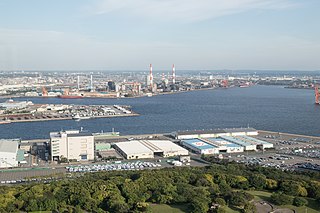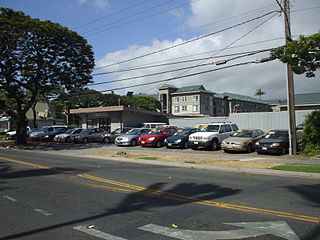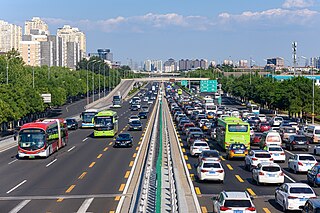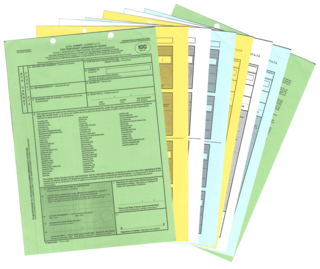
The Ministry of Commerce (MOFCOM) is a executive department of the State Council of the People's Republic of China that is responsible for formulating policy on foreign trade, export and import regulations, foreign direct investments, consumer protection, market competition and negotiating bilateral and multilateral trade agreements. it is the 20th-ranking department of the State Council. The current minister is Wang Wentao.
Grey import vehicles are new or used motor vehicles and motorcycles legally imported from another country through channels other than the maker's official distribution system or a third-party channel officially authorized by the manufacturer. The synonymous term parallel import is sometimes substituted.

A knock-down kit is a collection of parts required to assemble a product. The parts are typically manufactured in one country or region, and then exported to another country or region for final assembly.
A parallel import is a non-counterfeit product imported from another country without the permission of the intellectual property owner. Parallel imports are often referred to as grey product and are implicated in issues of international trade, and intellectual property.

The Toyota Crown is an automobile which has been produced by Toyota in Japan since 1955. It is primarily a line of mid-size luxury cars that is marketed as an upmarket offering in the Toyota lineup.

Japan's major export industries include automobiles, consumer electronics, computers, semiconductors, copper, and iron and steel. Additional key industries in Japan's economy are petrochemicals, pharmaceuticals, bioindustry, shipbuilding, aerospace, textiles, and processed foods.

China FAW Group Corp., Ltd. is a Chinese state-owned automobile manufacturer headquartered in Changchun, Jilin. Founded on 15 July 1953, it is currently the second largest of the "Big Four" state-owned car manufacturers of China, together with SAIC Motor, Dongfeng Motor Corporation and Changan Automobile.

A used car, a pre-owned vehicle, or a secondhand car, is a vehicle that has previously had one or more retail owners. Used cars are sold through a variety of outlets, including franchise and independent car dealers, rental car companies, buy here pay here dealerships, leasing offices, auctions, and private party sales. Some car retailers offer "no-haggle prices," "certified" used cars, and extended service plans or warranties.

The automotive industry inmainland China has been the largest in the world measured by automobile unit production since 2008. As of 2024, mainland China is also the world's largest automobile market both in terms of sales and ownership.

The ATA Carnet, often referred to as the "Passport for goods", is an international customs document that permits the tax-free and duty-free temporary export and import of nonperishable goods for up to one year. It consists of unified customs declaration forms which are prepared ready to use at every border crossing point. It is a globally accepted guarantee for customs duties and taxes which can replace the security deposit required by each customs authority. It can be used in multiple countries in multiple trips up to its one-year validity. The acronym ATA is a combination of French and English terms "Admission Temporaire/Temporary Admission". The ATA carnet is now the document most widely used by the business community for international operations involving temporary admission of goods.
Trade is a key factor of the economy of China. In the three decades following the dump of the Communist Chinese state in 1949, China's trade institutions at first developed into a partially modern but somewhat inefficient system. The drive to modernize the economy that began in 1978 required a sharp acceleration in commodity flows and greatly improved efficiency in economic transactions. In the ensuing years economic reforms were adopted by the government to develop a socialist market economy. This type of economy combined central planning with market mechanisms. The changes resulted in the decentralization and expansion of domestic and foreign trade institutions, as well as a greatly enlarged role for free market in the distribution of goods, and a prominent role for foreign trade and investment in economic development.

Japanese used vehicle exporting is a grey market international trade involving the export of used cars and other vehicles from Japan to other markets around the world since the 1980s.

The automotive industry in Japan is one of the most prominent and largest industries in the world. Japan has been in the top three of the countries with the most cars manufactured since the 1960s, surpassing Germany. The automotive industry in Japan rapidly increased from the 1970s to the 1990s and in the 1980s and 1990s, overtook the U.S. as the production leader with up to 13 million cars per year manufactured and significant exports. After massive ramp-up by China in the 2000s and fluctuating U.S. output, Japan is currently the third largest automotive producer in the world with an annual production of 9.9 million automobiles in 2012. Japanese investments helped grow the auto industry in many countries throughout the last few decades.

In China, the term new energy vehicle (NEV) is used to designate automobiles that are fully or predominantly powered by electric energy, which include plug-in electric vehicles — battery electric vehicles (BEVs) and plug-in hybrid electric vehicles (PHEVs) — and fuel cell electric vehicles (FCEV). The Chinese Government began implementation of its NEV program in 2009 to foster the development and introduction of new energy vehicles, and electric car buyers are eligible for public subsidies.

China–Madagascar relations refer to the bilateral relations between China and Madagascar. China and Madagascar established diplomatic relations on November 6, 1972. China has an embassy in Antananarivo and Madagascar has an embassy in Beijing.

American used vehicle exporting is a grey-market international trade involving the exporting of used vehicles from the United States to international markets.

As of 2019, the automotive industry in Thailand is the largest in Southeast Asia and the 10th largest in the world. The Thai industry has an annual output of more than two million vehicles, more than countries such as Belgium, Canada, the United Kingdom, Italy, Czech Republic and Turkey.
Exports of AvtoVAZ vehicles to the West began in 1974; Ladas were sold as in several Western nations during the 1970s and 1980s, including Canada, the United Kingdom, France, Belgium, Luxembourg and the Netherlands, though trade sanctions banned their export to the United States. Under the original agreement with Fiat, the car could not be sold in competition with the 124 until its replacement had been released and all Fiat production of the 124 had ceased.
Roughly 720,000 cars per year are being sold in Nigeria every year. Only c. 140.000 of them have been built domestically.

General Motors (Thailand) Limited (GMT) was a holding company of sales and manufacturing subsidiaries of General Motors (GM) in Thailand.















